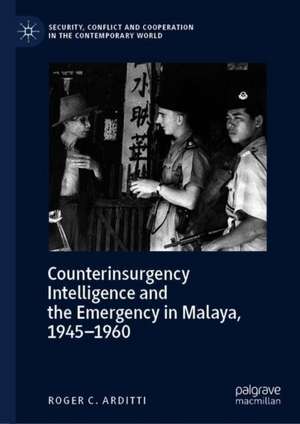Counterinsurgency Intelligence and the Emergency in Malaya: Security, Conflict and Cooperation in the Contemporary World
Autor Roger C. Ardittien Limba Engleză Hardback – 14 mai 2019
Din seria Security, Conflict and Cooperation in the Contemporary World
- 9%
 Preț: 765.10 lei
Preț: 765.10 lei - 20%
 Preț: 689.80 lei
Preț: 689.80 lei - 20%
 Preț: 565.89 lei
Preț: 565.89 lei - 20%
 Preț: 629.10 lei
Preț: 629.10 lei - 18%
 Preț: 785.42 lei
Preț: 785.42 lei - 18%
 Preț: 775.15 lei
Preț: 775.15 lei -
 Preț: 386.61 lei
Preț: 386.61 lei - 15%
 Preț: 584.43 lei
Preț: 584.43 lei - 15%
 Preț: 693.25 lei
Preț: 693.25 lei - 15%
 Preț: 527.97 lei
Preț: 527.97 lei - 15%
 Preț: 638.25 lei
Preț: 638.25 lei -
 Preț: 384.86 lei
Preț: 384.86 lei -
 Preț: 481.43 lei
Preț: 481.43 lei -
 Preț: 384.09 lei
Preț: 384.09 lei -
 Preț: 383.12 lei
Preț: 383.12 lei -
 Preț: 391.61 lei
Preț: 391.61 lei - 15%
 Preț: 638.76 lei
Preț: 638.76 lei - 18%
 Preț: 778.45 lei
Preț: 778.45 lei - 15%
 Preț: 639.37 lei
Preț: 639.37 lei -
 Preț: 390.63 lei
Preț: 390.63 lei -
 Preț: 385.84 lei
Preț: 385.84 lei - 15%
 Preț: 471.69 lei
Preț: 471.69 lei -
 Preț: 385.25 lei
Preț: 385.25 lei -
 Preț: 383.33 lei
Preț: 383.33 lei - 18%
 Preț: 731.10 lei
Preț: 731.10 lei - 18%
 Preț: 891.80 lei
Preț: 891.80 lei - 15%
 Preț: 699.77 lei
Preț: 699.77 lei - 15%
 Preț: 703.20 lei
Preț: 703.20 lei - 15%
 Preț: 588.18 lei
Preț: 588.18 lei -
 Preț: 386.81 lei
Preț: 386.81 lei - 18%
 Preț: 786.36 lei
Preț: 786.36 lei - 15%
 Preț: 638.57 lei
Preț: 638.57 lei -
 Preț: 380.63 lei
Preț: 380.63 lei -
 Preț: 390.63 lei
Preț: 390.63 lei
Preț: 586.55 lei
Preț vechi: 690.06 lei
-15% Nou
Puncte Express: 880
Preț estimativ în valută:
112.27€ • 121.99$ • 94.37£
112.27€ • 121.99$ • 94.37£
Carte tipărită la comandă
Livrare economică 21 aprilie-05 mai
Preluare comenzi: 021 569.72.76
Specificații
ISBN-13: 9783030166946
ISBN-10: 3030166945
Pagini: 230
Ilustrații: XXVII, 254 p. 1 illus.
Dimensiuni: 148 x 210 x 23 mm
Greutate: 0.49 kg
Ediția:1st ed. 2019
Editura: Springer International Publishing
Colecția Palgrave Macmillan
Seria Security, Conflict and Cooperation in the Contemporary World
Locul publicării:Cham, Switzerland
ISBN-10: 3030166945
Pagini: 230
Ilustrații: XXVII, 254 p. 1 illus.
Dimensiuni: 148 x 210 x 23 mm
Greutate: 0.49 kg
Ediția:1st ed. 2019
Editura: Springer International Publishing
Colecția Palgrave Macmillan
Seria Security, Conflict and Cooperation in the Contemporary World
Locul publicării:Cham, Switzerland
Cuprins
1 Introduction.- 2 Status Quo Ante.- 3 Creating a New Intelligence Apparatus in the Far East.- 4 Organisational Conflict.- 5 Intelligence Prior to the Declaration of Emergency.- 6 Para-Military Intelligence.- 7 Policing and Human Intelligence.- 8 Organising Intelligence.- 9 Conclusion.
Notă biografică
Roger C. Arditti is a full-time police officer in London and an associate researcher at Canterbury Christ Church University, UK. He previously studied at Brunel University London and Royal Holloway College, UK, and his primary research interests focus upon Britain’s post-war counter-insurgency campaigns and the role of intelligence.
Textul de pe ultima copertă
This book examines the full range of counterinsurgency intelligence during the Malayan Emergency. It explores the involvement of the Security Service, the Joint Intelligence Committee (Far East), the Malayan Security Service, Special Branch and wider police service, and military intelligence, to examine how British and Malayan authorities tackled the insurgent challenge posed by the Malayan Communist Party. This study assesses the nature of the intelligence apparatus prior to the declaration of emergency in 1948 and considers how officials attempted to reconstruct the intelligence structures in the Far East after the surrender of the Japanese in 1945. These plans were largely based upon the legacy of the Second World War but quickly ran into difficultly because of ill-defined remits and personality clashes. Nevertheless, officials did provide prescient warning of the existential threat posed by the Malayan Communist Party from the earliest days of British reoccupation of Malaya. Once a state of emergency had been declared, officials struggled to find the right combination of methods, strategy and management structures to eliminate the threat posed by the Communist insurgents. This book argues that the development of an effective counterinsurgency intelligence strategy involved many more organisations than just Special Branch. It was a multifaceted, dynamic effort that took far longer and was more problematic than previous accounts suggest. The Emergency remains central to counterinsurgency theory and thus this wide-ranging analysis sheds crucial light not only on the period, but on contemporary doctrine and security practices today.
Caracteristici
First book to examine the full range of counterinsurgency intelligence during the Malayan Emergency Maps the breadth of the intelligence apparatus in existence at the start of the Emergency and how this developed and changed over time Shows how intelligence strategies developed during the Emergency continue to remain at the heart of modern counterinsurgency doctrine
